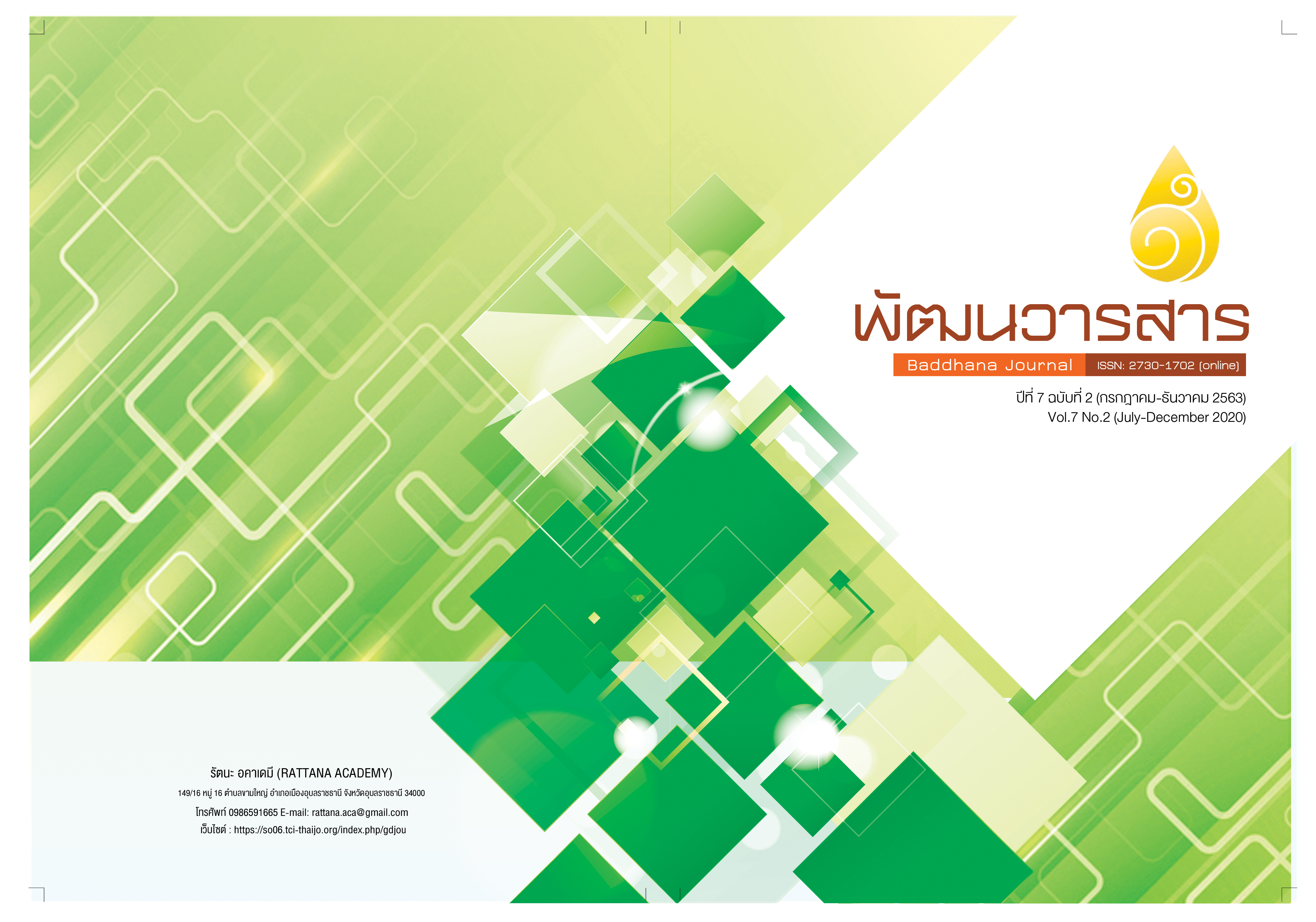Operational Development of Large-Scale Agricultural Extension System to Implementation
Main Article Content
Abstract
The purposes of this study were 1) To study factors affecting the operation of agricultural extension systems. 2) To study the problems regarding the operation of the agricultural extension system. And To develop a model for implementing agricultural extension system policy into practice. The samples were 296 people. And the sample interviews were 40 people. The tools of research were questionnaires and interview forms. The statistics used for analyzing the data were frequency, percentage, mean, standard deviation.
The findings revealed that:
- Opinions about the factors affecting the operation of large-scale agricultural extension systemoverview of all were moderate. The highest average was the cost reduction, product quality improvement and marketing.
- Opinions about the problems of the implementation of agricultural extension system overview of all were moderate. The highest average was the Farmer development. And the operations and public relations was the lowest average.
- Guidelines for the development of large-scale agricultural extension system implementation. The government should promote by transferring knowledge, produce farmer information and public relations for participation in the project. Farmers should be developed regarding production cost reduction, increasing production efficiency and managing agricultural plots, promote the sharing of production factors, develop marketing channels and should publicize to farmers to participate in production development, marketing. Regarding monitoring and evaluation should be meeting held to review the goals and project implementation guidelines.
Article Details
Section
Research Article
References
กลุ่มกำกับดูแลและพัฒนาเศรษฐกิจการค้า สำนักงานพาณิชย์ยังหวัดนครราชสีมา. (2563). การเกษตรแปลงใหญ่. (ออนไลน์) (อ้างเมื่อ 13 กุมภาพันธ์ 2563). จากhttps://www.dit.go.th/.
กวิตา ศรีวรมย์. (2556) สภาพการผลิตและความต้องการการส่งเสริมการผลิตผักชีฝรั่งของเกษตรกรในอำเภอธาตุพนม จังหวัดนครพนม. นนทบุรี: มหาวิทยาลัยสุโขทัยธรรมาธิราช.
คณะทำงานขับเคลื่อนการดำเนินงานระบบส่งเสริมการเกษตรแบบแปลงใหญ่. (2559). คู่มือ การดำเนินงานระบบส่งเสริมการเกษตรแบบแปลงใหญ่ กระทรวงเกษตรและสหกรณ์. กรุงเทพฯ: กระทรวงเกษตรและสหกรณ์.
จิรวุฒ มงคล. (2557) ความต้องการการส่งเสริมการเกษตรแปลงใหญ่ของเกษตรกรในจังหวัดสกลนคร. นนทบุรี: มหาวิทยาลัยสุโขทัยธรรมาธิราช.
ชนนิภา ทองรอดและคณะ. (2561). แนวทางการบริหารจัดการกลุ่มนาแปลงใหญ่บ้านทับยา จังหวัดสิงห์บุรี. ในโครงการประชุมเสนอผลงานวิจัยระดับชาติ มหาวิทยาลัยสุโขทัยธรรมาธิราช ครั้งที่ 8. (23 พฤศจิกายน 2561).
ดวงมณี โกมารทัต. (2551). วิวัฒนาการทางบัญชีบริหาร. วารสารเกษตรศาสตร์ธุรกิจประยุกต์, 2(1),55 - 67.
ทรงเกียรติ อิงคามระธร และคณะ. (2561). การพัฒนาเกษตรกรผู้ลูกสับปะรดจังหวัดราชบุรี ให้เป็น
Smart Farmer โดยการรียนรู้จาก Smart Farmer ต้นแบบ. รายงานวิจัยฉบับสมบูรณ์สำนักงานกองทุนสนับสนุนการวิจัย (สกว.)
นฤชล สีดี. (2555) ความต้องการการส่งเสริมการเกษตรของเกษตรกรบนพื้นที่สูงจังหวัดเลย. นนทบุรี: มหาวิทยาลัยสุโขทัยธรรมาธิราช.
พิกุล พงษ์กลาง. (2559). การเสริมสร้างความเข้มแข็งในการบริหารต้นทุนการผลิตของการปลูกข้าว กลุ่มวิสาหกิจชุมชนศูนย์ เมล็ดพันธุ์ข้าว ตำบลออนใต้ อำเภอสันกำแพง จังหวัดเชียงใหม่. วารสารวิจัยและพัฒนาเชิงพื้นที่, 10(13), 17-26.
สัจจา บรรจงศิริและคณะ. (2549) การพัฒนาศูนย์ข้าวชุมชน. นนทบุรี: สาขาวิชาส่งเสริมการเกษตรและสหกรณ์ มหาวิทยาลัยสุโขทัยธรรมาธิราช.
สุจิตรา นิธิยานันท์. (2555) ความต้องการการส่งเสริมการเกษตรของเกษตรกรผู้ทานาบ้านหนองสาหร่าย ตำบลพนอม อำเภอท่าอุเทน จังหวัดนครพนม. นนทบุรี: มหาวิทยาลัยสุโขทัยธรรมาธิราช.
อภิชาต พงษ์ศรีหดุลชัย. (2558). การประชุมแนวทางการจัดทำข้อมูลทะเบียนเกษตรกร. กรุงเทพฯ: ศูนย์เทคโนโลยีสารสนเทศและการสื่อสาร กรมส่งเสริมการเกษตร.
Yamane. (1967). Taro Statistic : An Introductory Analysis. New York: Harper &row.
กวิตา ศรีวรมย์. (2556) สภาพการผลิตและความต้องการการส่งเสริมการผลิตผักชีฝรั่งของเกษตรกรในอำเภอธาตุพนม จังหวัดนครพนม. นนทบุรี: มหาวิทยาลัยสุโขทัยธรรมาธิราช.
คณะทำงานขับเคลื่อนการดำเนินงานระบบส่งเสริมการเกษตรแบบแปลงใหญ่. (2559). คู่มือ การดำเนินงานระบบส่งเสริมการเกษตรแบบแปลงใหญ่ กระทรวงเกษตรและสหกรณ์. กรุงเทพฯ: กระทรวงเกษตรและสหกรณ์.
จิรวุฒ มงคล. (2557) ความต้องการการส่งเสริมการเกษตรแปลงใหญ่ของเกษตรกรในจังหวัดสกลนคร. นนทบุรี: มหาวิทยาลัยสุโขทัยธรรมาธิราช.
ชนนิภา ทองรอดและคณะ. (2561). แนวทางการบริหารจัดการกลุ่มนาแปลงใหญ่บ้านทับยา จังหวัดสิงห์บุรี. ในโครงการประชุมเสนอผลงานวิจัยระดับชาติ มหาวิทยาลัยสุโขทัยธรรมาธิราช ครั้งที่ 8. (23 พฤศจิกายน 2561).
ดวงมณี โกมารทัต. (2551). วิวัฒนาการทางบัญชีบริหาร. วารสารเกษตรศาสตร์ธุรกิจประยุกต์, 2(1),55 - 67.
ทรงเกียรติ อิงคามระธร และคณะ. (2561). การพัฒนาเกษตรกรผู้ลูกสับปะรดจังหวัดราชบุรี ให้เป็น
Smart Farmer โดยการรียนรู้จาก Smart Farmer ต้นแบบ. รายงานวิจัยฉบับสมบูรณ์สำนักงานกองทุนสนับสนุนการวิจัย (สกว.)
นฤชล สีดี. (2555) ความต้องการการส่งเสริมการเกษตรของเกษตรกรบนพื้นที่สูงจังหวัดเลย. นนทบุรี: มหาวิทยาลัยสุโขทัยธรรมาธิราช.
พิกุล พงษ์กลาง. (2559). การเสริมสร้างความเข้มแข็งในการบริหารต้นทุนการผลิตของการปลูกข้าว กลุ่มวิสาหกิจชุมชนศูนย์ เมล็ดพันธุ์ข้าว ตำบลออนใต้ อำเภอสันกำแพง จังหวัดเชียงใหม่. วารสารวิจัยและพัฒนาเชิงพื้นที่, 10(13), 17-26.
สัจจา บรรจงศิริและคณะ. (2549) การพัฒนาศูนย์ข้าวชุมชน. นนทบุรี: สาขาวิชาส่งเสริมการเกษตรและสหกรณ์ มหาวิทยาลัยสุโขทัยธรรมาธิราช.
สุจิตรา นิธิยานันท์. (2555) ความต้องการการส่งเสริมการเกษตรของเกษตรกรผู้ทานาบ้านหนองสาหร่าย ตำบลพนอม อำเภอท่าอุเทน จังหวัดนครพนม. นนทบุรี: มหาวิทยาลัยสุโขทัยธรรมาธิราช.
อภิชาต พงษ์ศรีหดุลชัย. (2558). การประชุมแนวทางการจัดทำข้อมูลทะเบียนเกษตรกร. กรุงเทพฯ: ศูนย์เทคโนโลยีสารสนเทศและการสื่อสาร กรมส่งเสริมการเกษตร.
Yamane. (1967). Taro Statistic : An Introductory Analysis. New York: Harper &row.


